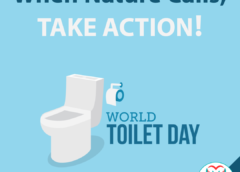World Toilet Day is celebrated on 19th November every year to raise awareness of the crisis and promote worldwide sanitation solutions so that all people have access to proper sanitation. The issue is of great concern to the 1 in 3 people worldwide who don’t have access to hygienic toilet facilities. About 2.3 billion people lack access to basic sanitation services, and currently, 1 in 5 children die from diarrheal diseases.
To solve this massive problem, the United Nations included “access to clean toilets†in the Sustainable Development Goals, which unite member countries to create health, prosperity, and a sustainable planet for all. One of the targets is to “By 2030, achieve access to adequate and equitable sanitation and hygiene for all and end open defecation, paying special attention to the needs of women and girls and those in vulnerable situations.â€
The world is currently off-track to meet SDG 6; with only 40 out of 152 countries are on track to achieve nearly universal basic sanitation by 2030.
Sanitation is a human right and every poor and marginalized section of society deserves a managed sanitation services. With this day let’s breaks the taboo around toilets and making sanitation for all a global development priority, encourage each other to get involved in this global movement.
Why we need World Toilet Day?
When we talk about inventions that transformed human health, the first thing we can think of is vaccines, penicillin, or modern treatments like chemotherapy. But toilets have contributed an incredible amount to improve health and wellness and continue to change lives in many places.
People, who lack toilet facilities, defecate in the open, often near living areas or the rivers that supply water for drinking or bathing. The unsafe disposal of human waste can spread disease like wildfire, invading homes, schools, hospitals, and other public spaces.
In many wealthy countries, diarrhoea is a minor, if embarrassing, personal issue. But in places where sanitary toilet facilities aren’t available, diarrhea can be a death sentence to individuals and whole communities. Small children are especially vulnerable.
Toilets, combined with clean water and good hygiene, form a strong defence against #COVID19 and future disease outbreaks.
Illnesses can also become a major reason for the loss of productivity because of the lack of sanitation and poor hygiene practices. These practices have costed many countries up to 5% of GDP. When employers provide access to clean toilets and hygiene stations, employees can protect themselves and others from illness.
Women’s safety is another important issue impacted by the availability of hygienic toilets. In places lacking sanitary facilities, women must travel to reach a toilet or relieve themselves in private. This puts them at risk for sexual violence. A police official from the Bihar state in India told the BBC that “about 400 women would have ‘escaped’ rape last year if they had toilets in their homes.
Conclusion
If the UN and its members can provide all people with adequate sanitation by 2030, it will create huge benefits. This simple technology can protect communities from disease and help people learn and work to the best of their abilities.

Leave a Reply
You must be logged in to post a comment.